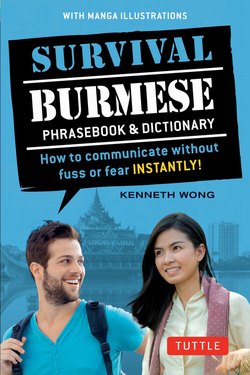Читать книгу Survival Burmese Phrasebook & Dictionary - Kenneth Wong - Страница 6
ОглавлениеPART ONE
Everyday Phrases
Useful Phrases
| Greetings!/Hello! | Min ga-lah bah! | မဂၤလာပါ၊ |
| Yes!/Right/Correct! | Hoke kaet! | ဟုတ္ကဲ႔။ |
| Is that so?/Is that the case? | Hoke laa. | ဟုတ္လား။ |
| It is so./That is the case. | Hoke tae. | ဟုတ္တယ္။ |
| It’s not so./It’s not true. | Ma hoke phoo. | မဟုတ္ဘူး။ |
NOTE Use hoke kaet like the English “yes” to express agreement or acceptance. However, the negative form ma hoke phoo is not a generic word for negation like the English “no”. Ma hoke phoo means “It’s not true.” Therefore, it’s not a suitable response to someone asking, “Are you feeling well?” (Nay kaungg laa), or someone insisting, “Please drink!” (Thauk pah).
Expressing Yourself
Is it good?
Kaungg laa.
ေကာင္းလား။
It’s good.
Kaungg dae.
ေကာင္းတယ္။
It’s not good.
Ma-kaungg boo.
မေကာင္းဘူး။
Do you like it?
Kyite laa.
ႀကိဳက္လား။
I like it.
Kyite tae.
ႀကိဳက္တယ္။
I don’t like it.
Ma-kyite phoo.
မႀကိဳက္ဘူး။
Do you know?
Thi laa.
သိလား။
I know.
Thi dae.
သိတယ္။
I don’t know.
Ma-thi boo.
မသိဘူး။
Got it? OK? Fine?
Ya laa.
ရလား။
Got it. OK. Fine.
Ya dae.
ရတယ္။
Not OK. Not fine.
Ma-ya boo.
မရဘူး။
Never mind.
Kait sa ma-shi boo.
ကိစၥမရွိဘူး။
Are you feeling well?
Nay kaungg laa.
ေနေကာင္းလား။
I’m feeling well.
Nay kaungg bah dae.
ေနေကာင္းပါတယ္။
I’m hungry.
Bike hsah dae.
ဗိုက္ဆာတယ္။
I’m tired.
Maww dae.
ေမာတယ္။
I’m bored.
Pyinn dae.
ပ်င္းတယ္။
I’m happy.
Pyaw dae.
ေပ်ာ္တယ္။
NOTE Pyaw dae uses the sentence structure Adjective + dae. Leave out the pronoun if you’re talking about your own feelings, but if the subject is someone else, add their name or title in front, e.g., Kelly pyaw dae “Kelly is happy”.
a little bit
naee naee
နည္းနည္း
a lot
a-myaa jee
အမ်ားႀကီး
very
thait
သိပ္
I’m sorry; I’m sad to hear (that).
Sait ma-kaungg boo.
စိတ္မေကာင္းဘူး။
I’m sorry for my imposition.
Arh nah dae.
အားနာတယ္။
NOTE Arh nah dae is a quintessential Burmese expression, used to apologize for imposing on someone, i.e.,“I’m sorry to ask you for such a huge favor” or to politely refuse a gift, present, or favor, i.e., “What you’re offering is too much; I can’t accept this.”
Please excuse me.
Ma-taw lo bah.
မေတာ္လို႕ပါ။
Please don’t be offended.
